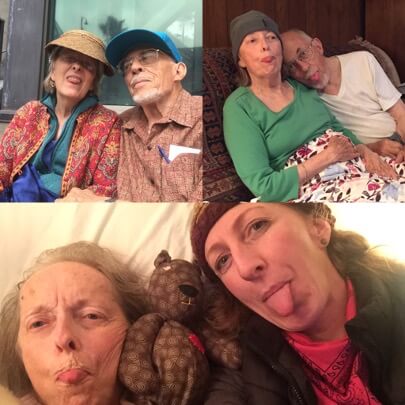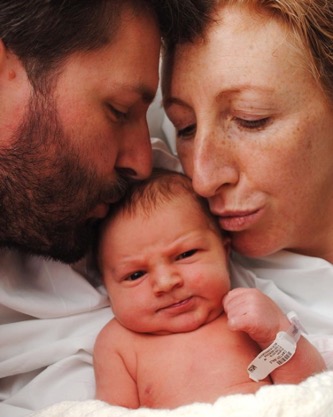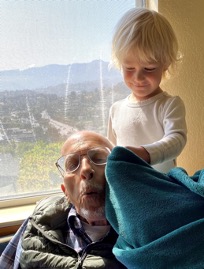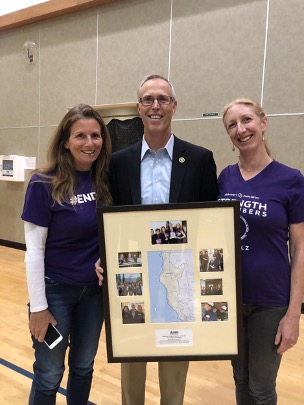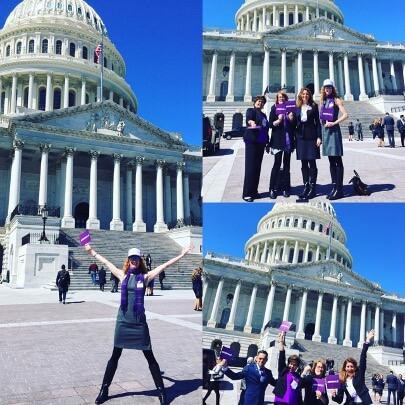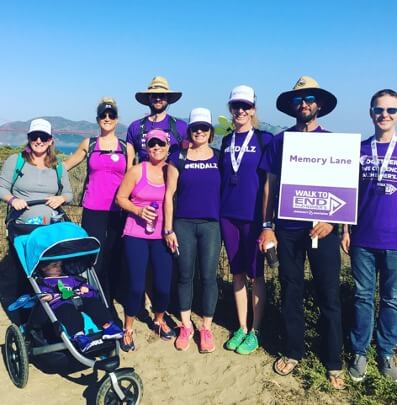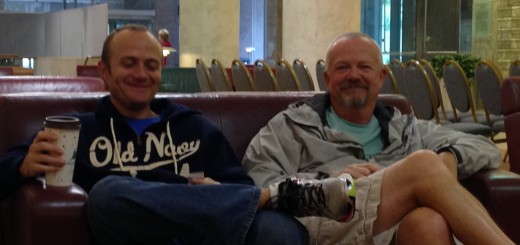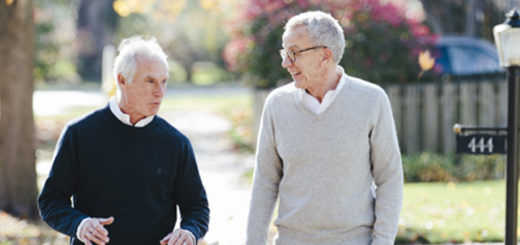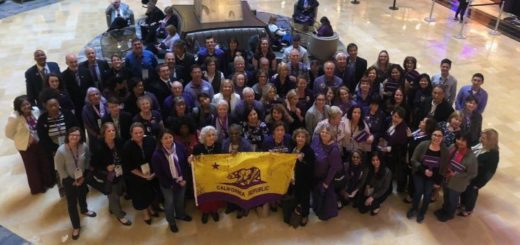Why I Advocate: A Young Caregiver’s Story
In September 2021 we held an online event for millennial and sandwich generation caregivers (those caring for both an older adult and a child). As part of this event, Vanessa Louise Carter of Tiburon shared her caregiving story and how it led her to advocacy. She was kind enough to allow us to share her remarks here.
I’m Vanessa Carter, and I’m the primary caregiver for my 84-year-old father, Ted who is living with Alzheimer’s. I had also been the primary caregiver for my mother, Valda Claire, who was living with Alzheimer’s and [Frontotemporal dementia] FTD until she passed away shortly after her 82nd birthday on July 10, 2019 on a sunny afternoon, holding my hand right after she heard her then five-month-old grandson giggling on the floor beside her bed.
For all of the sandwich generation caregivers here tonight, I see you. We may feel like a secret society huddled together as the sun sets and seasons change, rare in our roles — but most of the world HAS always and CONTINUES to care for their elders while raising the next generation. That’s the way society and labor and housing and community are designed globally — But in the United States, we have dismantled these traditions and structures. I yearn for the braiding of cultural and political and corporate will to support a society in which our work as caregivers is elevated and revered and normalized. And that it happen NOW, not waiting to add another layer of crisis as the tidal wave of boomers need care and meet this super unprepared system.
I was a functional but depressed caregiver for my mom. I was devastated by anticipatory grief that I didn’t understand for YEARS before she died. And now I am a sandwich generation, unpaid caregiver for my dad and my two and a half-year-old son. I’m drowning in the shoulds that plague working caregivers, especially during the pandemic. I should be giving my professional job more quality attention and producing exceptional work — I get paid to prepare the next generation to deal with the climate crisis – what could be more important than that?
How do I reconcile the scale of THAT responsibility with the biological drive I have to raise my son with all of the love and attention I can channel?
I should be caring for Westley, the light of my life who learns new skills and tells new jokes each day, showers me in hugs, and giggles with such unencumbered joy I melt with each burst of happiness.
Shouldn’t raising a kind and adventurous, anti-racist feminist be the most important thing I do so that he is able to responsibly live in his white skin with integrity and humility UNLIKE so many white men before him?
Well, if my dance card doesn’t sound full enough, let’s remember why I’m speaking today. Because my dad has Alzheimer’s! And it is my honor and responsibility to make sure that he is safe, as healthy as possible, and living a full life of social engagement, cognitive stimulation and joy.
And that he doesn’t burn the house down by accident.
Or have poop under his nails. Or slice the button holes of any more of his shirts because the holes got too small recently. Very mysterious.
Shouldn’t I be scheduling more for him to do since his day program has been closed since March of 2020? And no, Virtual Day Programming on Zoom just isn’t an engaging replacement for someone with cognitive impairment, cataracts and hearing loss.
Shouldn’t we go out more as a family?
Shouldn’t I be setting up regular decaf coffee dates with his friends (those that are still alive)?
Shouldn’t I drive him to Palo Alto for what is surely his last high school reunion?
Shouldn’t I be taking him to see my brothers more often?
How did this all happen? How did I end up married with a baby, caring for my parents in my childhood home in my 40’s?
It’s almost as if this had happened before.
My mom took care of her mom living with Alzehimer’s when I was a toddler.
But how did NONE of my parents’ physicians at any point take any initiative in suggesting, guiding, or facilitating a cognitive health screening and diagnostic process even though some of them disclosed later that they had suspected something?
How was it left up to me in my 30’s pretending to be a doctor — with best friends who are a PhD and MD in neurology — to tearfully bushwhack my way through a system happy to leave the overgrown path totally obfuscated and unconcerned with my desperate and unskilled machete swipes in the dark to figure out not one but two diagnoses, cobble together care plans, keep everyone from smashing flower pots in flustered rage and still manage to go to work and even shower most mornings? How did this all happen? Well, you’ll have to read my book someday to answer all that, I think. But how did I end up here, speaking to you all today? A tearful and desperate Google search connected me to the Alzheimer’s Association®.
When I was first coming to terms with my mother’s diagnosis in 2014 — though we noticed signs as early as 2012, incorrectly attributed to chemo-brain related to her breast cancer treatment — I was desperately sad and overwhelmed, aching for there to be a way to fix it — but I couldn’t. And I was terribly guilt-ridden that all I was learning about the disease, the care, the choices, the economics — all of this knowledge — was only impacting my small family. I felt selfish and navel-gazing. It broke every rule in my activist’s body — I was supposed to be leveraging my power and privilege strategically to benefit the greatest possible number of community members. And there I was, almost unable to have a conversation with another human without bursting into tears. No exaggeration.
Somehow before I found a therapist or a support group, I discovered a role to channel my energy through advocacy. I became the Alzheimer’s Association’s Volunteer Advocate to Representative Jared Huffman of California’s District 2 from the Golden Gate Bridge to the Oregon border.
Now I had some focus, a bigger purpose, people outside of my family to be accountable to and to support. With my team of advocates, women in our 40’s and 50’s who had cared for our mothers and one who had managed several board-and-care facilities as if each patient WERE her own mother, we donned our purple #ENDALZ shirts and stalked Representative Huffman at every local appearance he made. We stood in that public comment line every time and thanked him for his support. And asked for more.
This was a time of crash-course learning in so many arenas of my life. I was learning practical caregiving strategies like how to change adult diapers for my bed-bound mama. Not the pull ups she used to wear like underwear but the open ones with adhesive tabs, just like baby diapers, only bigger. I learned to line up the adult diaper in a tight jelly roll with the bed pad just right and gently get it underneath the LEFT side of her sleeping body in her hospital bed in the den in the middle of the night so that when I rolled her over to her RIGHT side, it would be waiting there, ready for me to unroll it, perfectly centered so she could rest on her back again, dry, perhaps slightly more comfortable. Now picture that with a 10 pound baby in my very pregnant belly. There’s no photo documentation of that part of the journey but this ritual in the stillness that is unique to the middle of the night is seared into my memory. I sang her the lullabies that she had sung to me when I was little. Hospice nurses and certified nursing assistants taught me how to do this — I was never as good as them. They are angels among us.
I was also learning what I believe everyone is supposed to learn before high school graduation — that I definitely did NOT understand before MY high school graduation: that along with my right to vote comes my remarkable responsibility to be a participant in the democratic process by choosing the causes that I care most deeply about and engaging my elected officials. That I belong in the offices of members of Congress. That my voice matters to them. That my story might resonate personally with them and contribute to systems change.
I share this part of my journey because it has been therapeutic as well as strategic in our collective long game. It’s like the climate crisis: there’s mitigation and adaptation. Sure, we want a cure. We want to avoid dementia in its many forms altogether. So we need funding for research, and we need participants in clinical trials, both healthy and early stage participants.
But there’s also the fact that there’s a LOT to manage NOW that over six million people are living with Alzheimer’s or a related dementia in the U.S. and that between family caregivers and underpaid women of color, mostly immigrants, we’re taking care of them all — at home, in care settings or in some revolving door between the two. That’s why we all logged in tonight. Because our lives have been inconveniently interrupted, and it’s a bumpy ride. No one asked our permission, and no one taught us what to do in advance. So now we have to cope. Community building is part of that. And storytelling is how we weave our interdependent web of connections.
Whether you share your story with elected officials, your support group, your friends, or any and every person you speak with (that was me for a while. EVERYBODY knew my family’s story), you build a schema for people to reference when it becomes personal in the future or you validate people who are living in the shadows, too overwhelmed to give voice to this new chapter.
And let’s be honest, Alzheimer’s makes for rich stories. And some dark stand-up. Because you just can’t make this stuff up.
How many people have to keep buying child safety latches for the cabinets not because their toddler keeps destroying them but because their cognitively impaired dad keeps attacking them with scissors?

And how many 6’1” daughters expect to get body-checked by their 5 foot tall, 80-year-old mama escaping a bath after returning home from yet another unsatisfying trip to the emergency room (ER)? For those of you not there, yet, bathing can get really colorful at a certain point. And what turn out to be “unnecessary” ER visits are dreadfully common, unpleasant and costly.
And how do you explain to the cat why Grampa Ted fed her potstickers tonight?
Or how would I have known to buy my mom the robotic cat that purred and meowed to keep her company if someone hadn’t told me about it working for their mom?
No matter how hard it has been to parent my parents, I do not envy the care partners – the wives, the husbands, the partners – who are losing their best friends and whose social network might not be up to the challenge. I took my dad to a lunch to celebrate a family friend who had recently passed away. I knew everyone at the lunch. I had communicated with them about my mother’s diagnosis and passing. They all knew about my dad’s diagnosis. I haven’t really heard from any of them since 2012, but I always send them family holiday cards, cause that’s what you do when your mom can’t anymore. Anyway, I called ahead to the restaurant to make sure they would serve my dad the bottle of fake wine without him knowing (pro tip – fake wine – that’s real). And as we gathered and sat down, I realized there were CLEARLY two other men sitting at the table with cognitive impairment whose wives were acting as if nothing was wrong. I’m so deep in shining a light on this disease, I forget there’s a world in which people are just going to dig into the denial phase — maybe forever.
This is all so hard. Growing up, my mom would always tell me, “This, too, shall pass,” when I was suffering. At the time, it felt invalidating of my feelings, but I’ve come to realize it speaks volumes of her resilience and determination. In this case, it’s true, eventually our loved ones will die, and in many cases it’s all so miserable that I can’t count the number of times someone in my support group has revealed, myself included — filled with all of the sadness and shame and despair you can imagine — that they are ready for it to be over. But my mom also used to remind me to, “Press on, regardless.” My question is, what will the quality of the time be like along the journey? How will we channel the anxiety and the anticipatory grief and the resentment and the fear?
Here’s my aspirational list of how to get through this, replete with all the reasons why I still need the list.
- Therapy and a support group: Full disclosure – my healthcare provider graduated me from therapy because I’m not depressed enough anymore. You can imagine the thoughts and feelings I have about that. So it’s on my to-do list to find a therapist that doesn’t break the bank. And I aged out of my support group (for younger caregivers) — and it was getting so crowded in there. When I started there were something like four of us who consistently showed up. Now the Zoom tiles spill over onto two screens. So I need to check in with the new support group for the middle-of-the-roaders. On my list.
- Advocacy: We need policy changes that build the infrastructure to support the millions of us navigating this LONG slog. Lawmakers listen when our voices are loud, consistent, compelling and intersectional. Otherwise, corporate profit drives the conversation. Full disclosure: I described my advocacy pre-Westley, but this is a marathon, so I tagged my co-conspirator whose mother passed a few years before mine and doesn’t have young children. She’s driving the advocacy train right now, hard. We can’t all be tracking Congress’ legislative agenda at once, but we do all need to tag in occasionally when we’re needed to tell our stories. The day our stories are so familiar it’s a snooze for congressional health staffers is the day that we’ve got all of the resources we need. We’re not there, yet.
- Self care: Laughable, I know. But you know what? It turns out that all of the things we think are so critical in our caregiving sagas that prevent us from taking care of ourselves — we won’t remember them. We won’t remember that we did them on any particular day. We won’t remember the consequence of forgetting or delaying these tasks every so often. I’m not suggesting that anyone here become a negligent caregiver. But I am suggesting that we are perhaps already substandard caregivers by being so obsessed with our person we love – that we aren’t taking care of ourselves. I’m in my second week of getting exercise again. After a pandemic of pretty much no exercise. “Pandemic” is a unit of time, to be clear.
If anyone needs any additional convincing as to why therapy, support groups, advocacy and self care are so important: our emotional and physical health is what we CAN influence to reduce our OWN risk of developing cognitive impairment. I know I’m pretty clear that I’d like to end this family tradition. Full stop. Thanks, everyone. Remember, this, too, shall pass. And in the meantime, we must press on, regardless.
If you think your loved one has Alzheimer’s or another dementia or would like to find out more about the Alzheimer’s Assocation and how we can help, please call the Alzheimer’s Association 24/7 Helpline at 800.272.3900. The Helpline is available around the clock, 365 days a year. Through this free service, specialists and master’s-level clinicians offer confidential support and information to people living with dementia, caregivers, families and the public.
Learn more:





